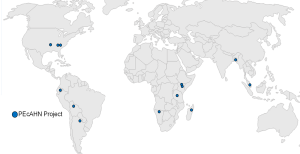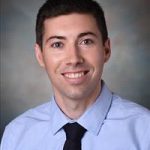The Population Ecology, Aging, and Health Network (PEcAHN) will focus on addressing rural disparities in aging and health.
Connections to the CPC and other regional institutions will be central to this effort, but PEcAHN will also incorporate researchers from institutions around the US. Projects included in PEcAHN are geographically and racially diverse, but all of them work with rural and low-income communities in the US and around the globe. PEcAHN provides a unique opportunity to integrate research from across these communities to address common themes and factors affecting health and aging in rural and under-resourced populations, including lack of access to health care and other infrastructure, challenges with remote data collection, and rapidly evolving lifestyle changes. The goal of PEcAHN is to support collaborative and integrative research across sites, find common factors affecting rural and economic health disparities and solutions for addressing them, share methodological approaches for working with remote and under-resourced communities, and support and develop early career researchers with interest in these areas.

Aims for the Population Ecology, Aging, and Health Network (PEcAHN) in Core D.
Aim 1. Build and develop the PEcAHN External Collaborative Network.
Founded in Fall 2023, PEcAHN currently includes more than 20 researchers actively engaged in long-term community-based research across 13 sites in the US and abroad. We will expand this network to encompass an even greater range of sites and ecologies, with particular emphasis on incorporating projects in the rural US and enhance existing connections to institutions in the Durham, NC region.
Aim 2. Support research and multi-site collaboration in these areas through workshops and other opportunities to share discoveries and methodologies.
Through twice-yearly meetings, a community website, collaborative papers, and joint research projects across sites, PEcAHN will provide opportunities for researchers to share discoveries and solutions in rural health and aging research. Funds will be made available to support pilot projects that focus on the same question and methods across sties. Working groups will conduct multi-site analyses to uncover common factors affecting health and aging across populations.
Aim 3. Develop early career researchers with interests in this area.
Meetings, collaborative projects (e.g. papers), and research support will be focused on providing early career researchers with opportunities to develop and build their skillset. Meetings will also provide opportunities to network with researchers at other sites and institutions.
Population Ecology, Aging, and Health Network (PEcAHN) Leadership and Membership
Started in 2023, the Population Ecology, Aging, and Health Network (PEcAHN) brings together research teams conducting intensive, long-term fieldwork in rural communities in the US and abroad.
Herman Pontzer, PhD (Evolutionary Anthrology. Core E Director) Pontzer is a Professor of Evolutionary Anthropology and Global Health at Duke University and a DUPRI Scholar. He is a Co-PI of the previous P-30 grant and has been leading the External Collaborative Network for that project since 2022. His research focuses on the impacts of physical activity and environment on daily energy expenditure, energy balance, and cardiometabolic health. Much of his research has focused on rural and remote communities in the global South. In addition to serving as the director of PEcAHN, he has worked directly with several of the research sites involved, including fieldwork with the Hadza and Daasanach communities, and collaborations with the Tsimane and Shuar communities. His research group is currently working with two projects investigating lifestyle and environmental factors affecting chronic disease and aging in two rural US communities, the PASTOR Health study (PI: David Eagle, Duke University) and the Great Smoky Mountain Study of Rural Aging (PI: William Copeland, University of Vermont).
PEcAHN Member Projects Population Ecology, Aging, and Health Network (PEcAHN) currently includes 23 researchers across 13 sites in the US and abroad. Current member projects in the US include the Great Smoky Mountain Study of Rural Aging, a longitudinal study of 1,500 people in western North Carolina ongoing since 1992, with 25% enrollment of Native American participants (Eastern Band of Cherokee Indians) [ref], as well as the Rural Embodiment And Community Health study of more than 2,000 participants in a rural Mississippi region that is >95% Black or African American Projects abroad include long-term, life-course focused research in rural indigenous communities in South America [refs], eastern and southern Africa [refs], Madagascar [refs], and southeast Asia [refs].
All PEcAHN member projects examine health over the life course, and all include work on chronic disease with aging, but they have a range of different foci. For example, the PASTOR Health and Great Smoky Mountain Study in the US have examined the impact of psychosocial stressors on cardiometabolic outcomes; work in Madagascar, Mississippi, and Ecuador has included analyses of infectious disease risk; work in Tanzania and Bolivia has focused on age-related cognitive decline; projects in Malaysia and Kenya have investigated the impact of economic develop on chronic disease risk. The diversity in research focus and methodology enables PEcAHN members to learn and develop new ideas and approaches.


Figure 3. Upper: The location of current (2024-25) PEcAHN research projects. Bottom: Attendees of the first in-person PEcAHN meeting, April 2024 at Duke University.
| Researcher | Institution | Project | Location | |
|---|---|---|---|---|
| Herman Pontzer, PhD |  | Duke Univ. | PEcAHN Director | |
| Amanda McGrosky, PhD |  | Elon Univ. | Daasanach Health & Life History Project | Kenya |
| Asher Rosinger, PhD |  | Penn State Univ. | ||
| Michael Gurven, PhD |  | UC Santa Barbara | Tsimane Life History Project | Bolivia |
| William Copeland, PhD |  | University of Vermont | Great Smoky Mountain Study of Rural Aging | US (North Carolina) |
| Theresa Gildner, PhD |  | Washington Univ. St. Louis | Rural Embodiment And Community Health (REACH) | US (Mississippi) |
| Tara Cepon-Robins, PhD |  | Univ. of Colorado | ||
| Charles Nunn, PhD |  | Duke Univ. | Madagascar One Health | Madagascar |
| Samuel Urlacher, PhD |  | Baylor Univ. | Shuar Life History Project | Ecuador |
| J. Josh Snodgrass, PhD |  | University of Oregon | ||
| David Eagle, PhD |  | Duke Univ. | PASTOR Health Study | US (North Carolina) |
| Eric Trexler, PhD |  | Duke Univ. | ||
| Claudia Valeggia, PhD |  | Yale Univ. | Chaco Area Reproductive Ecology Program | Argentina |
| Melanie Martin, PhD |  | Univ. of Washington | ||
| Kathrine Starkweather, PhD |  | Univ. of Illinois, Chicago | Shodagor Longitudinal Health & Demography Project | Bangladesh |
| Haley Ragsdale, PhD |  | Univ. of Illinois, Chicago | ||
| Thomas Kraft, PhD |  | Univ. of Utah | Orang Asli Health and Lifeways Project | Malaysia |
| Vivek Venkataraman, PhD |  | Univ. of Calgary | ||
| Ian Wallace, PhD |  | Univ. of New Mexico | ||
| Amanda Lea, PhD |  | Vanderbilt Univ. | Turkana Health & Genomics Project | Kenya |
| Brian Wood, PhD |  | UCLA | Hadza Health and Demography Project | Tanzania |
| David Raichlen, PhD |  | Univ. Southern California | ||
| Brooke Scelza, PhD |  | UCLA | Kunene Rural Health and Demography Project | Namibia |
| Sean Prall, PhD |  | UCLA |
